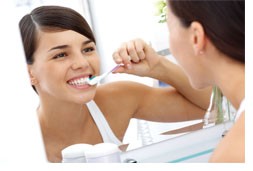Things have come a long way since we put baking soda on our fingers to clean our teeth and had to wear wooden dentures if they fell out! Thank goodness! Nowadays, we have an enormous assortment of dental health and dental care products to help us get rid of plaque and bacteria that are gentle on our gums. Still, people are visiting the dentists so what is going wrong? There is so much more to know about dental health than simply brushing twice a day to get white, cavity free teeth, so we have compiled a top ten list that covers everything you need to know about oral care.
1. Brushing
It is important to brush first thing in the morning to remove plaque and bacteria that have accumulated over night and to brush last thing at night because saliva (which helps to keep the cavity-causing plaque off teeth) dries up as we sleep. Toothbrushes should come with a small head and soft bristles. Set a timer for 2 minutes, hold the brush at a 45 degree angle. Start at the same place every time begin by working your way around each tooth in turn. Ensure you clean all faces of the teeth to avoid missing any areas and don't forget your gums.
2. Flossing
Use dental floss to clean in-between the teeth where plaque collects. Floss before you brush to remove any plaque from these areas. Roughly 90% of problems arise from areas between the teeth so it is important to floss effectively. Hold floss tightly between your thumbs and forefingers and guide it between your teeth using a gentle sliding action. When the floss reaches where the tooth meets the gum, curve it into a V shape against the tooth and gently slide it up and down between the gum and the tooth. Repeat for the other side and every tooth. For larger gaps you can us an inter-dental brush.
3. Electric toothbrushes
Electric toothbrushes are recommended by a large number of dental professional for their superior performance when compared to manual brushing. Electric toothbrushes tend to have small brush heads that cup around the tooth and are faster and more efficient in cleaning areas of the mouth where bacteria and plaque collect.
4. Waterjets
Waterjets, or Oral Irrigators, used instead of flossing, are devices where pressurized streams of water are blasted out of the device to remove plaque from the areas between the teeth not reached by brushing alone. Tests have shown that if you use a water jet in conjunction with daily brushing, you will remove 99% more plaque than via brush alone. Gum health is also improved by up to 93%, compared to brushing alone and gingivitis and calculus are significantly reduced after only 2–4 weeks of use.
5. Avoiding dry mouth
Saliva provides an essential defense against tooth decay and periodontal disease. Where there is insufficient saliva serious dental health problems can arise. Persistent dry mouth could be a symptom of a disease or a side effect of certain medicines. For dry mouth sufferers there are a number of highly effective products that either stimulate saliva production or replace it altogether. For more information read: Dry Mouth Symptoms And Treatments.
6. Fresh breath
There are a number of causes of bad breath, the most common of which is poor oral care. Volatile Sulfur Compounds (VSC) are produced when naturally occurring bacteria break down plaque and food debris in the mouth. By keeping plaque and debris in check bacteria have less to feed on and reproduce less frequently. In addition to cleaning thoroughly between the teeth it is recommended that you also clean your tongue on a daily basis.
7. Use of mouthwash
If you are looking for a good mouthwash then make sure it is alcohol-free, as alcohol is an irritant and can dry out the mouth. This will have the effect of reducing the amount of saliva present, and make your teeth more susceptible to bacteria. The benefits of a mouthwash are that they can reach areas not touched by brushing alone. Rinse twice a day – once in the morning and last thing at night and always after brushing.
8. Whiter teeth
A white smile eludes health and happiness but particularly difficult to achieve for those who smoke, drinking red wine and other tannin containing drink. Luckily there are a number of products available that will enable you have the smile you've always wanted. We offer an in-office and home Teeth Whitening service.
9. New toothbrush
Did you know you should change your toothbrush every two to three months for good dental hygiene? If you do not then bacteria will collect on the bristles and you will transfer them back into your mouth. Moreover, the bristles will become soft and ineffective. For electric toothbrushes the same rule applies. If your toothbrushes are wearing out before two months then you are probably brushing too harshly. Ask your dentist to show you the correct way of brushing. Always chose a toothbrush with soft not hard bristles as hard bristles can cause damage to the soft tissue in your mouth, including your gums.
10. Clean your tongue
A major cause of bad breath can actually come from bacteria building up on your tongue with a high percentage of it accumulating at the back, making it hard to reach. Use a proper tongue scraper every morning to remove tongue plaque and freshen your breath. A daily tongue scraping will help banish harmful bacteria and remember, using a tongue scraper is more effective than brushing your tongue with a toothbrush.



